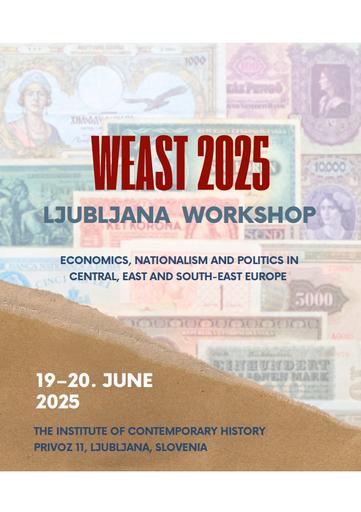/
Dogodki
/
Konference
Slovenian economic nationalism on the example of Anton Kajfež’s company in Kočevje


To delo avtorja Ivan Smiljanić je ponujeno pod Creative Commons Priznanje avtorstva-Nekomercialno-Deljenje pod enakimi pogoji 4.0 Mednarodna
Datoteke (1)
Opis
During the Austro-Hungarian period, there was a strong defence of the national interest in the economic field present among Slovenian entrepreneurs, which in practice meant dealing with the German economy, protected by the state authorities. After the establishment of the Kingdom of Serbs, Croats and Slovenes, these problems were expected to get subsided, but the year 1918 was far from being a clear turning point. The paper will analyse one of the more striking Slovenian examples from the interwar period, the company of the influential merchant Anton Kajfež from Kočevje. Kočevje, as an ethnically specific settlement in which the Slovenes were in the minority due to the dominance of the Gottscheers, medieval colonisers of German origin, remained the scene of the struggle for economic and thus political supremacy even after the collapse of Austria-Hungary. Since the beginning of the 20th century, Kajfež acted as an unwavering supporter of the Slovenian camp, which he regularly financed with his substantial wealth. He took care of the establishment of Slovenian cultural and financial institutions, and he employed only Slovenians as workers. After 1918, he continued his work undisturbed and finally created a closely intertwined economic-financial-political Slovenian system in Kočevje, which was supposed to finally defeat the Gottscheer influence. Nevertheless, a too relaxed attitude towards the business balance and too extensive operations, which brought increasing losses, led to a business disaster and bankruptcy of Kajfež’s company by the second half of the 1920s. With the sudden withdrawal of Kajfež’s influence, the Gottscheers were once again able to prevail in the Kočevje region. The Kajfež affair illustrates the importance of economic nationalism in the Slovenian space beyond its “classic” period under Austria-Hungary and proves that an opponent is not necessarily responsible for economic collapse in such conflicts.
Metapodatki (12)
- identifikatorhttps://hdl.handle.net/11686/71107
- naslov
- Slovenian economic nationalism on the example of Anton Kajfež’s company in Kočevje
- avtor
- Ivan Smiljanić
- soavtor
- Neja Blaj Hribar (mod.)
- predmet
- gospodarstvo
- nacionalizem
- Kočevje
- Anton Kajfež
- opis
- During the Austro-Hungarian period, there was a strong defence of the national interest in the economic field present among Slovenian entrepreneurs, which in practice meant dealing with the German economy, protected by the state authorities. After the establishment of the Kingdom of Serbs, Croats and Slovenes, these problems were expected to get subsided, but the year 1918 was far from being a clear turning point. The paper will analyse one of the more striking Slovenian examples from the interwar period, the company of the influential merchant Anton Kajfež from Kočevje. Kočevje, as an ethnically specific settlement in which the Slovenes were in the minority due to the dominance of the Gottscheers, medieval colonisers of German origin, remained the scene of the struggle for economic and thus political supremacy even after the collapse of Austria-Hungary. Since the beginning of the 20th century, Kajfež acted as an unwavering supporter of the Slovenian camp, which he regularly financed with his substantial wealth. He took care of the establishment of Slovenian cultural and financial institutions, and he employed only Slovenians as workers. After 1918, he continued his work undisturbed and finally created a closely intertwined economic-financial-political Slovenian system in Kočevje, which was supposed to finally defeat the Gottscheer influence. Nevertheless, a too relaxed attitude towards the business balance and too extensive operations, which brought increasing losses, led to a business disaster and bankruptcy of Kajfež’s company by the second half of the 1920s. With the sudden withdrawal of Kajfež’s influence, the Gottscheers were once again able to prevail in the Kočevje region. The Kajfež affair illustrates the importance of economic nationalism in the Slovenian space beyond its “classic” period under Austria-Hungary and proves that an opponent is not necessarily responsible for economic collapse in such conflicts.
- založnik
- Inštitut za novejšo zgodovino
- datum
- 19. 06. 2025
- tip
- video
- jezik
- Angleščina
- jeDelOd
- pravice
- licenca: ccByNcSa
